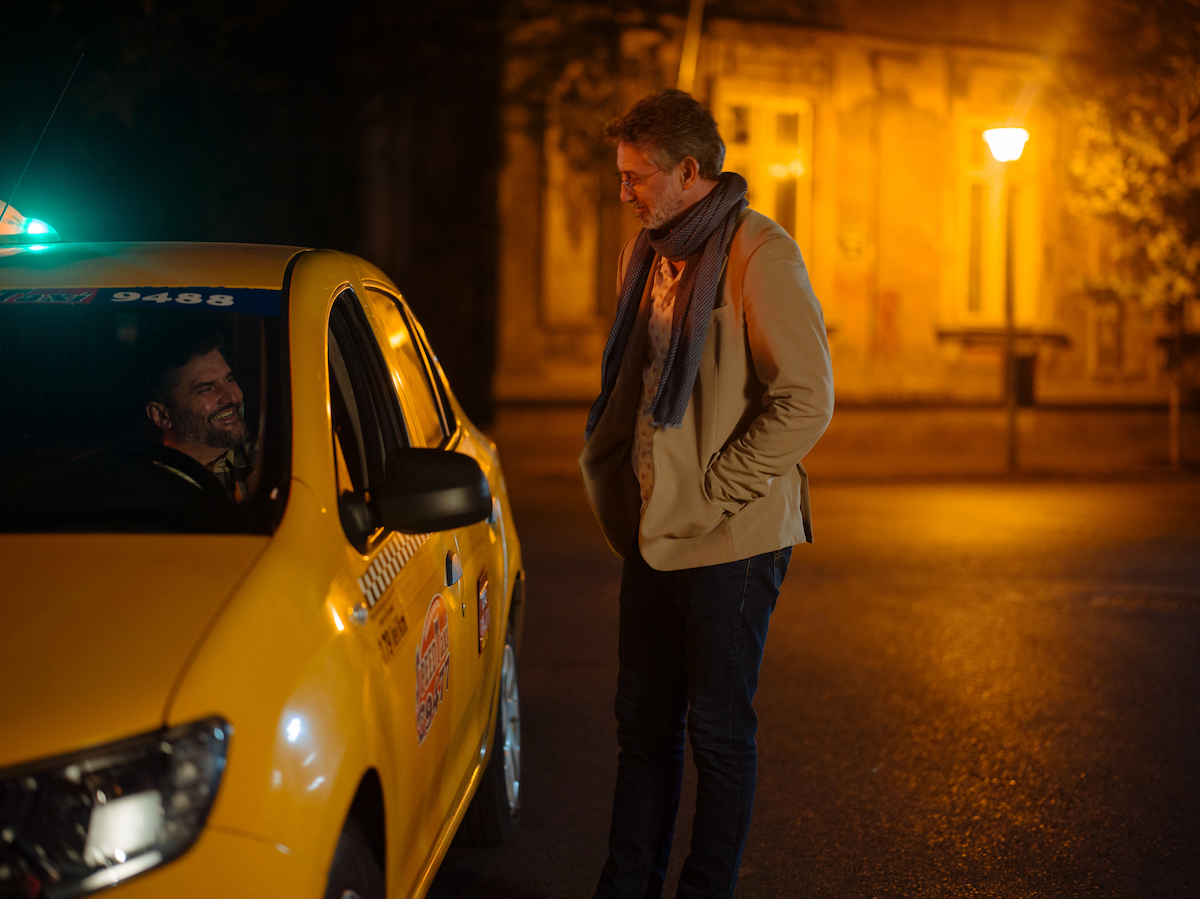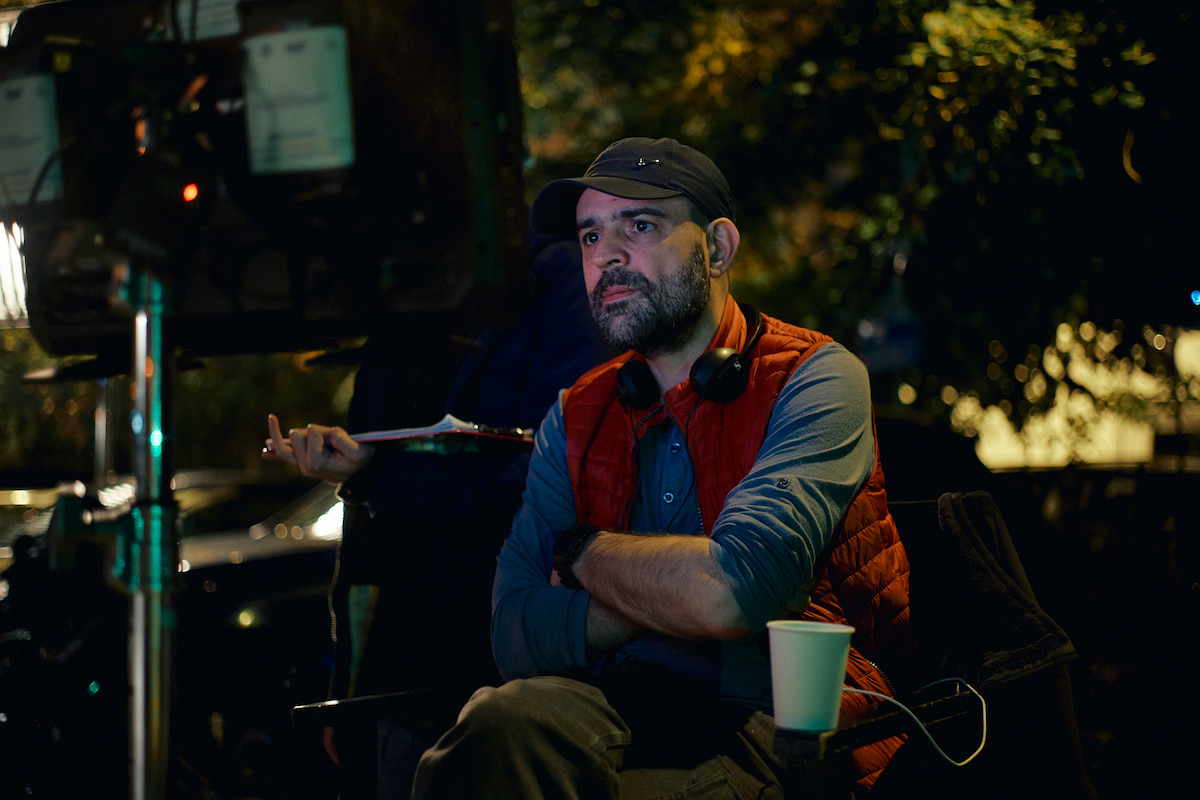
After Team Building became the highest-grossing Romanian film of all time, as well as the most talked-about film online, another Romanian comedy is set to premiere on the big screen, this time about Bucharest taxi drivers and their customers.
The film is called “Taxi Drivers”, it is an adaptation of the play that became a hit four years ago and will be released on January 20, 2023.
In short, the film follows Lika (Alexandra Yohn) and Liviu (Rolando Matsangos), two taxi drivers trying to survive the night shift, where every customer has a problem and every ride is an adventure.
They both share the frustration of a job that they hope will provide them with a decent living and maybe some savings until they find something better. For Lika, he receives money, for Livia – satisfaction of the soul. That is until everyone starts thinking more about what they have, who they are and what they can do with their lives.
For them, the night shift in Bucharest is a real adventure, during which they meet a wide variety of people – from young partygoers and corporate executives to stars, DJs and even subordinates.
The cast includes many well-known actors: Alexandru Ion (“Portrait of a Fighter in his Youth”, “Las Fierbinţi”), Ronaldo Matsangos (“The Paper Will Be Blue”, “Sieranevada”), Maria Popistashu (“Tuesday after Christmas”, “Entregalde”) , Victoria Railianu (“Vlad”), Monika Byarladianu (“Of Men and Snails”, “The Death of Mr. Lazarescu”, “Closer to the Moon”), Andy Vasluianu (“Seranevada”, “Shadows”). “, “About people and snails”) or Cosmin Nedelcu “Micutzu” (“Team building”).
“The roadway is probably the most brutal place in Bucharest”
“Our goal was to create a ‘true’ story about how stupid, vulnerable and wonderful people are, how much they say and how little they do. But we realized we weren’t very good at it and wrote a comedy about taxi drivers,” says Adrian Nicolae, co-writer and actor.
“The roadway is probably the most brutal place in Bucharest. People from all walks of life show the worst version of themselves, threaten, insult, spit, fight. And taxi drivers are right at the epicenter of this cataclysm, they are the most despised and despised by drivers. How can you not make a film about them?”, adds Bohdan Teodor Olteanu, director and co-author of the script.
Bohdan Teodor Olteanu is a director, screenwriter and playwright. His first feature film, A Few Talks About a Very Tall Girl, had four nominations at the Gopo Awards — for Best Debut, Best Actress (Silva Mihai, Florentina Nestase) and Young Hope (Tudor D. Popescu).
The premiere of the second film “Miya Longs for Revenge” was held in Warsaw, where it received the “Special Jury Prize”. It was also nominated for two Gopo Awards – for “Best Actress in a Leading Role” (Yoana Bugarin) and for “Best Supporting Actress” (Maria Popistasu).
Both films have been acquired by both HBO and Netflix.
“Argumentation is the default language of modern Bucharest”

A frame from the film. PHOTO: Adi Bulboak
Tell us a little about the play “Taxi Drivers” and why you felt the need to bring it to the big screen
Bohdan Teodor Olteanu: We started writing the piece, me and Adrian Nicolae, when Uber first entered the market. People talked and wrote almost religiously about ridesharing.
Uber drivers were like characters from Victorian novels, all of them listening to classical music, speaking at least two foreign languages and handing out Santa Claus-like sweets. Whereas taxi drivers were tools of Satan.
I still find it a very difficult subject. Saying “Uber is good”, “taxi is bad” or vice versa is childish.
While documenting ourselves for this text, we began to empathize with taxi drivers. Let’s also find out from which families they come, what their social status is and what they carry. We did not set ourselves the goal of passing any verdict, only to understand more carefully what is hidden behind the label “taxi driver”.
I think at that point we were also populated by some kind of Hykka-Countryism. That all the people around us were very neoliberal: “I want things to happen as I say with my money.” Rather solipsistic language: “If I’m crying in a restaurant, I want the chef to be happy that he’s cooking for me.”
Of course. That’s just how life works. It is easy to say “taxi drivers are so-so” without understanding. But why are they the way they are? That this is only a symptom. For many reasons. Some of them are exposed in the film.
What is lost or gained in this process of transformation from play to film for the big screen?
It is difficult for me to give a general answer. It depends on what kind of play you’re watching and it depends on what kind of movie you want to make. In our case, it was lost because of the time spent with the characters. There were only six characters in the play and it lasted two hours. The film lasts an hour and a half and has many characters.
On the other hand, the film is much more aggressive with the viewer. It forces you to be closer to the characters, everything happens faster, there are much more visual stimuli. It’s more chaos and tension.
In every series, someone is attacked, someone is the aggressor, and you witness it as if you were sitting in the car with them. Brighter colors and more contrast everywhere. The dialogue is always accompanied by the noise of the city.
How did you choose the actors for the feature film, I saw that there are also some big names: Monika Birledianu, Andi Vasluianu, Mikutsu?
A name with weight is a relative concept. In general, probably yes, but for me the most important names in the film are Alexandru Ion, Rolando Matsangos, Maria Popistashu, Viktoriya Railyanu or Madalina Stoika. They play the characters that build the film.
Andi Vasluianu, Kozmin Nedelka and Monika Barladianu are very respectable actors. I enjoyed working with each of them and would like to repeat the experience.
We left actors from the theater for the main roles. I am convinced that no one could have done anything more consistent in their roles.
How much is Taxi Driver a film about Bucharest, given that it is saturated with typologies of people we often see in the city?
Adrian Nicolae and I were born and raised in Bucharest. We have all the good and all the bad of the city and I think everything we do has a bit of Bucharest as well. In this film (and the show that preceded it) even more so.
Taxis transport people from all areas of the city and from all social classes. Public transport of any kind is a zone where different tectonic plates of society collide.
Many of your works are devoted to the prejudices of Romanian society. What prejudices are we talking about in Taximeters? Will we look at taxi drivers differently after watching the film?
I don’t know if we will necessarily look at them differently, but I hope that the audience will at least question this generalization. If it is not even a habit to stick such hard labels. Taxi drivers come in many ways: bad, good, happy, and unhappy.
They are the same as their passengers. At least it is naive to imagine that you can reduce several thousand people to a small fixed number of attributes.

Bohdan Teodor Oltyanu. PHOTO: Sorin Florea
Before “Taximetrists” there was the TV series “Shadows”. How would Lika and Liviu get along with Relu?
It would be very difficult for me to support the comparison. I only saw two (or three?) episodes of “Shadows”, the ones in which Silvana Mihai played, because I wanted to see her. I assume that Sherban Pavlou would get along well with Rolando Matsangos and Alexandru Ion. He is a smart actor and has a sense of humor. I don’t know how the characters would get along with each other because I don’t know Rela.
Logistically, how difficult is it to shoot in Bucharest?
When you shoot with cars, you find that in Bucharest there is rarely more than 50 meters without potholes. I’m not a driver and found this out when the camera was running. Pits, canals, tram tracks, cubic stone. Road space in Bucharest is a bad joke.
In addition, walking around Bucharest a lot, you understand how friendly the local residents are, regardless of the district, level of education, social class. Arguments are the default language for modern Bucharest residents.
How much did it cost to make a film like “Taximetristi” and how do you expect it to do at the box office, especially since more and more Romanian films have been making very good profits in recent years?
It cost much more than the two previous feature films and somewhat less than a film usually costs in Romania. I hope a lot of people will see it — in that sense, there’s a premeditated work behind the film, from how it’s written to how it’s shot or edited.
It is a product that is audience-friendly both because of the dramatic structures used and the conventionality of the acting. It’s 85% comedy and that should bring people to the movies.
What do you think of the new Romanian comedies breaking through at the box office? Of course, I mean Team Building, which became the highest-grossing Romanian film of all time, or Miami Beach, Tabara, etc. Is it generally beneficial for Romanian cinema, even if it is light and superficial productions?
I have no idea if they benefit cinema and how. I perceive them more as media phenomena. Are social networks good for journalism? In some ways yes, and in some ways no. And I wouldn’t collect them anyway.
Team building is what looks and sounds like a movie. I would hardly say the same about “The Camp”. Although in a very broad sense, everything that is filmed and gets on the cinema screen (and not only) is a part of cinematographic culture.
They are definitely beneficial for actors or technicians as they earn money from their work. And they get a lot of followers on Instagram, which is generally good for self-esteem. They are also good for cinemas because they have a lot of viewers and therefore money. And especially for manufacturers, because money.
Whether money is good or bad and whether it brings happiness or not is a complex question that I do not have an answer to. Not even for me.
- Read also: Teambuilding, the film that makes the history of Romanian cinema. Interview with screenwriter Alex Kotec about the comedy in which it is very possible to find your office colleagues
Source: Hot News
Ashley Bailey is a talented author and journalist known for her writing on trending topics. Currently working at 247 news reel, she brings readers fresh perspectives on current issues. With her well-researched and thought-provoking articles, she captures the zeitgeist and stays ahead of the latest trends. Ashley’s writing is a must-read for anyone interested in staying up-to-date with the latest developments.